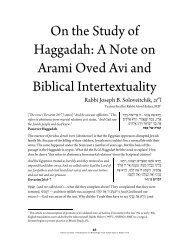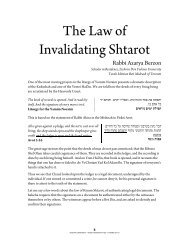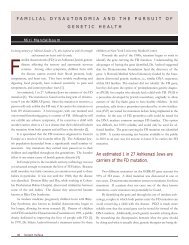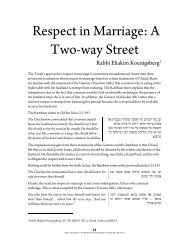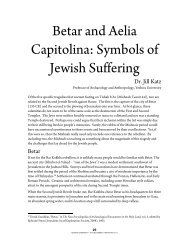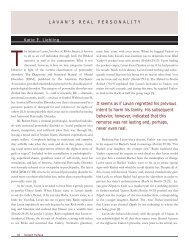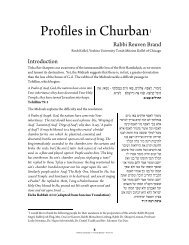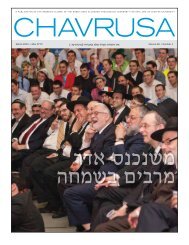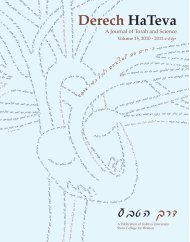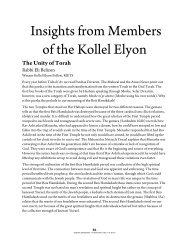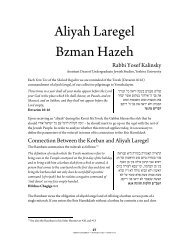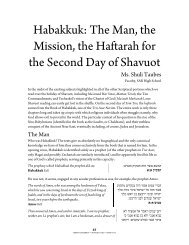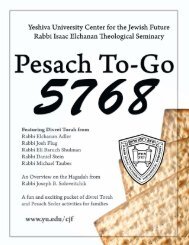YESHIVA UNIVERSITY • SUKKOT TO-GO ... - YU Torah Online
YESHIVA UNIVERSITY • SUKKOT TO-GO ... - YU Torah Online
YESHIVA UNIVERSITY • SUKKOT TO-GO ... - YU Torah Online
You also want an ePaper? Increase the reach of your titles
YUMPU automatically turns print PDFs into web optimized ePapers that Google loves.
shall rejoice before the Lord your God. But now that the Temple is<br />
no longer in existence, there is no rejoicing except with wine, as it is<br />
said, and wine that makes glad the heart of man.<br />
Pesachim 109a (adapted from Soncino Translation)<br />
26<br />
<strong>YESHIVA</strong> <strong>UNIVERSITY</strong> <strong>•</strong> <strong>SUKKOT</strong> <strong>TO</strong>-<strong>GO</strong> <strong>•</strong> TISHREI 5771<br />
תיב ןיאש וישכעו ךיקלא 'ה<br />
ןייב אלא החמש ןיא םייק שדקמה<br />
. שונא בבל חמשי ןייו רמאנש<br />
. טק םיחספ<br />
Simcha requires one to sanctify the physical. It is only through the sanctification of physical that<br />
one can achieve the proper state of simcha.<br />
Yom Kippur and Sukkot seem to be holidays with opposing themes. Why then is Sukkot<br />
observed immediately after Yom Kippur? R. Yitzchak Abuhab (14 th century) provides the<br />
following suggestion 9 :<br />
God commanded rejoicing on Sukkot after the days of<br />
repentance to teach us that He does not desire that we afflict<br />
our bodies throughout the year, only when there is a need for<br />
us to subdue our hearts and return to the righteous path, and<br />
even then [on condition] that we return to rejoicing in our<br />
hearts and [cause] our family [to rejoice] for the observance of<br />
mitzvot … Do not think in your hearts that I gave you this<br />
festival [of Sukkot] to fast like Yom Kippur. Rather you should<br />
eat, drink, offer peace offerings and voluntary offerings in order<br />
to rejoice for seven days. In order that nobody think that this is<br />
[merely] a celebration of gluttony, it states "The festival of<br />
Sukkot is seven days for God," meaning that the entire<br />
celebration should be for the sake of heaven.<br />
Menorat HaMaor no. 146<br />
וב חומשל ה"<br />
בקה הוצ תוכוסה גחו<br />
ץפח וניאש ונדמלל הבושתה ימי רחאל<br />
היהשכ אלא םימיה לכ ונפוג תונעל<br />
הרשי ךרדל בושל ונבבל ענכהל ךרוצ<br />
ישנאלו ונבבל חמשל בושנש הז לכ םעו<br />
ובשחת לא ... הוצמ רבדל ונתיב<br />
וב תונעתהל הז גח םכל יתתנש םכבבלב<br />
ותשתו ולכאתש אלא<br />
ה"<br />
יב ומכ<br />
תעבש חומשל תובדנו םימלש ובירקתו<br />
תאזש םדא םוש בושחי אלש יפלו . םימי<br />
ביתכ כ"<br />
ע סרכ יולימ לש איה החמשה<br />
לכ רמולכ 'הל<br />
םימי תעבש תוכוסה גח<br />
. םימש םשל אלא אהת אל החמש תאז<br />
ומק 'ס<br />
רואמה תרונמ<br />
Yom Kippur provides one with an opportunity to reach great spiritual heights. One might<br />
erroneously conclude that Yom Kippur is the only way to achieve those great spiritual heights<br />
and that living a life of asceticism is the ideal. Therefore, Sukkot comes as a counterbalance to<br />
Yom Kippur where one has the opportunity of reaching great spiritual heights by sanctifying the<br />
physical.<br />
Now that we understand the themes of Yom Kippur and Sukkot, we can resolve the apparent<br />
discrepancy in Rama's writings. Rama's statement in the laws of Yom Kippur was intended for<br />
someone studying the laws of Yom Kippur in preparation for the day. It was written for someone<br />
with a Yom Kippur mindset. As such, Rama's focus is on the purely spiritual aspects of the<br />
mitzvot. Therefore, one should build a sukkah immediately after Yom Kippur simply because it<br />
is an additional opportunity to be involved in a mitzvah. By contrast, the laws of Sukkot were<br />
written for someone with a Sukkot mindset. As such, the language reflects the need to sanctify<br />
the physical. For this reason, Rama stresses that one should begin building the sukkah<br />
immediately following Yom Kippur because one should not allow a mitzvah opportunity to<br />
spoil. This indicates that the mitzvah of sukkah is something special and that there is great<br />
9 R. Simcha Zissel Ziv (1824-1898), Ohr Rashaz no. 443, presents a similar idea.



